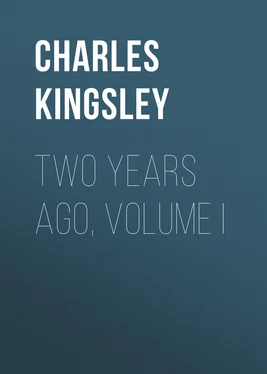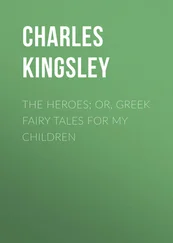Charles Kingsley - Two Years Ago, Volume I
Здесь есть возможность читать онлайн «Charles Kingsley - Two Years Ago, Volume I» — ознакомительный отрывок электронной книги совершенно бесплатно, а после прочтения отрывка купить полную версию. В некоторых случаях можно слушать аудио, скачать через торрент в формате fb2 и присутствует краткое содержание. Жанр: foreign_prose, literature_19, foreign_antique, на английском языке. Описание произведения, (предисловие) а так же отзывы посетителей доступны на портале библиотеки ЛибКат.
- Название:Two Years Ago, Volume I
- Автор:
- Жанр:
- Год:неизвестен
- ISBN:нет данных
- Рейтинг книги:5 / 5. Голосов: 1
-
Избранное:Добавить в избранное
- Отзывы:
-
Ваша оценка:
- 100
- 1
- 2
- 3
- 4
- 5
Two Years Ago, Volume I: краткое содержание, описание и аннотация
Предлагаем к чтению аннотацию, описание, краткое содержание или предисловие (зависит от того, что написал сам автор книги «Two Years Ago, Volume I»). Если вы не нашли необходимую информацию о книге — напишите в комментариях, мы постараемся отыскать её.
Two Years Ago, Volume I — читать онлайн ознакомительный отрывок
Ниже представлен текст книги, разбитый по страницам. Система сохранения места последней прочитанной страницы, позволяет с удобством читать онлайн бесплатно книгу «Two Years Ago, Volume I», без необходимости каждый раз заново искать на чём Вы остановились. Поставьте закладку, и сможете в любой момент перейти на страницу, на которой закончили чтение.
Интервал:
Закладка:
But why, when the boys wanted to be begged off, was the schoolmistress to be their advocate? Because Grace Harvey exercised, without intending anything of the kind, an almost mesmeric influence on every one in the little town. Goodness rather than talent had given her wisdom, and goodness rather than courage a power of using that wisdom, which, to those simple, superstitious folk, seemed altogether an inspiration. There was a mystery about her, too, which worked strongly on the hearts of the West-country people. She was supposed to be at times "not right;" and wandering intellect is with them, as with many primitive peoples, an object more of awe than of pity. Her deep melancholy alternated with bursts of wild eloquence, with fantastic fables, with entreaties and warnings against sin, full of such pity and pathos that they melted, at times, the hardest hearts. A whole world of strange tales, half false, half true, had grown up around her as she grew. She was believed to spend whole nights in prayer; to speak with visitors from the other world; even to have the power of seeing into futurity. The intensity of her imagination gave rise to the belief that she had only to will, and she could see whom she would, and all that they were doing, even across the seas; her exquisite sensibility, it was whispered, made her feel every bodily suffering she witnessed, as acutely as the sufferer's self, and in the very limb in which he suffered. Her deep melancholy was believed to be caused by some dark fate—by some agonising sympathy with evil-doers; and it was sometimes said in Aberalva,—"Don't do that, for poor Grace's sake. She bears the sins of all the parish."
So it befell that Grace Harvey governed, she knew not how or why, all hearts in that wild simple fishing-town. Rough men, fighting on the quay, shook hands at Grace's bidding. Wives who could not lure their husbands from the beer-shop, sent Grace in to fetch them home, sobered by shame: and woe to the stranger who fancied that her entrance into that noisy den gave him a right to say a rough word to the fair girl! The maidens, instead of envying her beauty, made her the confidant of all their loves; for though many a man would gladly have married her, to woo her was more than any dared; and Gentleman Jan himself, the rightful bully of the quay, as being the handsomest and biggest man for many a mile, beside owning a tidy trawler and two good mackerel-boats, had said openly, that if any man had a right to her, he supposed he had; but that he should as soon think of asking her to marry him, as of asking the moon.
But it was in the school, in the duty which lay nearest to her, that Grace's inward loveliness shone most lovely. Whatever dark cloud of melancholy lay upon her own heart, she took care that it should never overshadow one of those young innocents, whom she taught by love and ruled by love, always tender, always cheerful, even gay and playful; punishing, when she rarely punished, with tears and kisses. To make them as happy as she could in a world where there was nothing but temptation, and disappointment, and misery; to make them "fit for heaven," and then to pray that they might go thither as speedily as possible, this had been her work for now seven years; and that Manichaeism which has driven darker and harder natures to destroy young children, that they might go straight to bliss, took in her the form of outpourings of gratitude (when the first natural tears were dried), as often as one of her little lambs was "delivered out of the miseries of this sinful world." But as long as they were in the world, she was their guardian angel; and there was hardly a mother in Aberalva who did not confess her debt to Grace, not merely for her children's scholarship, but for their characters.
Frank Headley the curate, therefore, had touched altogether the wrong chord when he spoke of displacing Grace. And when, that same afternoon, he sauntered down to the pier-head, wearied with his parish work, not only did Tardrew stump away in silence as soon as he appeared, but Captain Willis's face assumed a grave and severe look, which was not often to be seen on it.
"Well, Captain Willis?" said Frank, solitary and sad; longing for a talk with someone, and not quite sure whether he was welcome.
"Well, sir?" and the old man lifted his hat, and made one of his princely bows. "You look tired, sir; I am afraid you're doing too much."
"I shall have more to do, soon," said the curate, his eye glancing towards the schoolmistress, who, disturbed by the noise above, was walking slowly up the beach, with a child holding to every finger, and every fold of her dress.
Willis saw the direction of his eye, and came at once to the point, in his gentle, straightforward fashion.
"I hear you have thoughts of taking the school from her, sir?"
"Why—indeed—I shall be very sorry; but if she will persist in going to the chapel, I cannot overlook the sin of schism."
"She takes the children to church twice a Sunday, don't she? And teaches them all that you tell her—"
"Why—yes—I have taken the religious instruction almost into my own hands now."
Willis smiled quietly.
"You'll excuse an old sailor, sir; but I think that's more than mortal man can do. There's no hour of the day but what she's teaching them something. She's telling them Bible stories now, I'll warrant, if you could hear her."
Frank made no answer.
"You wouldn't stop her doing that? Oh, sir," and the old man spoke with a quiet earnestness which was not without its effect, "just look at her now, like the Good Shepherd with His lambs about His feet, and think whether that's not much too pretty a sight to put an end to, in a poor sinful world like this."
"It is my duty," said Frank, hardening himself. "It pains me exceedingly, Willis;—I hope I need not tell you that."
"If I know aught of Mr. Headley's heart by his ways, you needn't indeed, sir."
"But I cannot allow it.—Her mother a class leader among these Dissenters, and one of the most active of them, too.—The school next door to her house. The preacher, of course, has influence there, and must have. How am I to instil Church principles into them, if he is counteracting me the moment my back is turned? I have made up my mind, Willis, to do nothing in a hurry. Lady-day is past, and she must go on till Midsummer; then I shall take the school into my own hands, and teach them myself, for I can pay no mistress or master; and Mr. St. Just—"
Frank checked himself as he was going to speak the truth; namely, that his sleepy old absentee rector, Lord Scoutbush's uncle, would yawn and grumble at the move, and wondering why Frank "had not the sense to leave ill alone," would give him no manner of assistance beyond his pittance of eighty pounds a-year, and five pounds at Christmas to spend on the poor.
"Excuse me, sir, I don't doubt that you'll do your best in teaching, as you always do: but I tell you honestly, you'll get no children to teach."
"No children?"
"Their mothers know the worth of Grace too well, and the children too, sir; and they'll go to her all the same, do what you will; and never a one will enter the church door from that day forth."
"On their own heads be it!" said Frank, a little testily; "but I should not have fancied Miss Harvey the sort of person to set up herself in defiance of me."
"The more reason, sir, if you'll forgive me, for your not putting upon her."
"I do not want to put upon her or any one. I will do everything. I will—I do—work day and night for these people, Mr. Willis. I tell you, as I would my own father. I don't think I have another object on earth—if I have, I hope I shall forget it—than the parish: but Church principles I must carry out."
"Well, sir, certainly no man ever worked here as you do. If all had been like you, sir, there would not be a Dissenter here now; but excuse me, sir, the Church is a very good thing, and I keep to mine, having served under her Majesty, and her Majesty's forefathers, and learnt to obey orders, I hope; but don't you think, sir, you're taking it as the Pharisees took the Sabbath-day?"
Читать дальшеИнтервал:
Закладка:
Похожие книги на «Two Years Ago, Volume I»
Представляем Вашему вниманию похожие книги на «Two Years Ago, Volume I» списком для выбора. Мы отобрали схожую по названию и смыслу литературу в надежде предоставить читателям больше вариантов отыскать новые, интересные, ещё непрочитанные произведения.
Обсуждение, отзывы о книге «Two Years Ago, Volume I» и просто собственные мнения читателей. Оставьте ваши комментарии, напишите, что Вы думаете о произведении, его смысле или главных героях. Укажите что конкретно понравилось, а что нет, и почему Вы так считаете.












